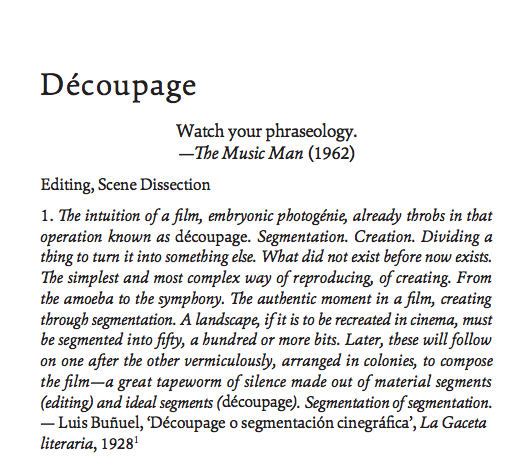 |
| Screenshot from Les Statues meurent aussi (Alain Resnais/Chris Marker, 1953) |
"I never had any special appetite for filmmaking, but you have to make a living
and it is miraculous to earn a living working in film." - Alain Resnais
- Michael Atkinson., 'Storytelling', Moving Image Source, 2009
- Jenny Chamarette, 'Les Statues meurent aussi', Senses of Cinema, 52, 2009
- Crissa-Jean Chappel, 'Alain Resnais and Atom Egoyan', Cinetext, July 2003
- Angela Dalle Vacche, 'Interstices and Impurities in the Cinema: Art and Science', Alphaville, Issue 5, 2013
- Katharine Anne (Gabele) Douglass, 'Pika-Don and Motion Pictures: The Atomic in Cinema ', Montage,1, 2008
- Robert Farmer, 'Marker, Resnais, Varda: Remembering the Left Bank Group', Senses of Cinema, 52, 2009
- Sarah French, 'From History to Memory: Alain Resnais’ and Marguerite Duras’ Hiroshima mon amour', Melbourne Art Journal, Issue 3, 2008
- David Hudson, 'Last Year at Marienbad at 50', Daily: MUBI, June 20, 2011
- Goh Wee Kiat, 'Regarding Resnais: Levinasian Responsibility in Alain Resnais’s Night and Fog', Academia.edu, date unknown
- Alex Ling, 'Parentheses in Time: L’Année Dernière à Marienbad (1961) as Amorous Event', Screening the Past, 43, 2012
- Alessandra Madella, The woman condition: love and technology in Hiroshima mon amour, PhD thesis, University of Iowa, 2011
- Hannah Mowat, 'Nature versus architecture: navigating the threshold in Alain Resnais’s L’Année dernière à Marienbad, Stanley Kubrick’s The Shining and Jessica Hausner’s Hotel', Frames, Issue 2, 2012
- Jenny Munro, 'Toujours sous la neige: Snow, Stasis and Immobility in Alain Resnais'L'Amour mort and Coeurs', Scope, Issue 23, 212
- Lindsay Peters, 'Ashes of Time', Moving Image Source, 2011
- Jonathan Rosenbaum, 'The Unknown Statue', Moving Image Source, 2009
- Jonathan Rosenbaum, 'Three Key Moments from Three Alain Resnais Films', JonathanRosenbaum.com, June 2007
- Donato Totaro, 'Hiroshima Mon Amour', Offscreen Journal, August 31, 2003
- Andrew Tracy, 'After the Revolution', Moving Image Source, 2008
- Deborah Walker, 'Resnais/Derrida: Reconstructing the Subject', Literature and Aesthetics, 10, 2000















